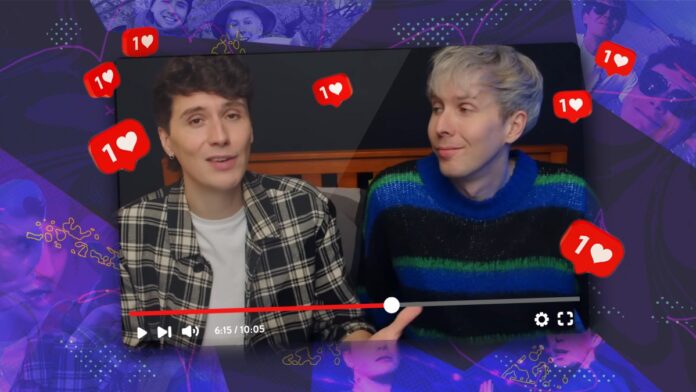For nearly 16 years, Dan Howell and Phil Lester — foundational figures of British YouTube who helped shape the creator economy — have been the subject of fervent speculation regarding their relationship. Now, the duo has confirmed what fans have long suspected: they are in love. Their recent 46-minute video, presented as a satirical “conspiracy” documentary, offers not just confirmation, but a profound reflection on the complexities of parasocial relationships and the evolving dynamics of fandom.
The Phenomenon of “Shipping” and RPF
The video taps into a long-standing online phenomenon known as “shipping,” particularly evident in the intense speculation surrounding the duo, affectionately dubbed “Phan.” Their story exemplifies “RPF,” or “real person fiction,” a term initially associated with fan fiction but that has expanded to encompass the belief that real-life celebrities are romantically involved. This is not an isolated incident; the enduring obsession with Harry Styles and Louis Tomlinson (dubbed “Larry Stylinson”) illustrates how RPF can become entrenched and, at times, emotionally harmful. While usually harmless, where RPF bleeds into obsession, it can be unsettling.
The Problem with Entitlement & Invasion of Privacy
Howell and Lester’s reveal could have easily taken a confrontational route. They could have pointed fingers, criticized fans for their behavior, and highlighted the invasive nature of online stalking. Indeed, their fans did cross boundaries, scrutinizing their lives to an uncomfortable degree—from recreating their flat using Google Street View specs to engaging in sexual speculation. The creators acknowledge the impact this had, and the extent to which they had to censor themselves and avoid promotional events to protect their privacy and maintain a sense of individuality.
A Compassionate Approach
Instead, Howell and Lester opted for a strikingly compassionate approach. They don’s tin foil hats, playfully referencing online conspiracy theories, and carefully mirror the behavior of their fanbase over the years. The video isn’t about assigning blame; it’s about understanding the motivations and naivete of young people who were still developing an understanding of the consequences of their actions. Howell shared a vulnerable glimpse into his own difficult childhood and the importance of authenticity, while Lester, who previously came out privately, expressed his steadfast support throughout.
Redefining Boundaries in the Digital Age
Their reveal is particularly insightful given current trends where celebrities are actively pushing back against overly-entitled fans and are attempting to redefine acceptable boundaries. Fan spaces have become intertwined with the personal lives of creators, creating a constant negotiation of privacy and expectations. As fandom researcher Nancy Baym has noted, the expectation of constant online engagement has blurred the lines between work and personal life, creating an ongoing need to define appropriate behavior.
A Moment of Reset and Forgiveness
At the 30-minute mark, Howell and Lester use the opportunity to reestablish their own boundaries: while shipping and creative writing (fan fiction) are welcomed, invasive digging into their personal lives and sexual speculation are not. This isn’t a condemnation, but an invitation for growth and forgiveness—both for their fans and for themselves. Howell’s closing point—the importance of extending patience and grace to others—encapsulates the core message of the video.
Ultimately, Dan and Phil’s relationship reveal isn’t just about confirming a long-held secret; it’s a nuanced exploration of parasocial relationships, the power of fandom, and the need for compassion in an increasingly interconnected world. It serves as a blueprint for navigating the complex dynamics between creators and audiences in the digital age, advocating for a future rooted in respect, understanding, and mutual growth.
Watch the full video here.
This article reflects the opinion of the writer
